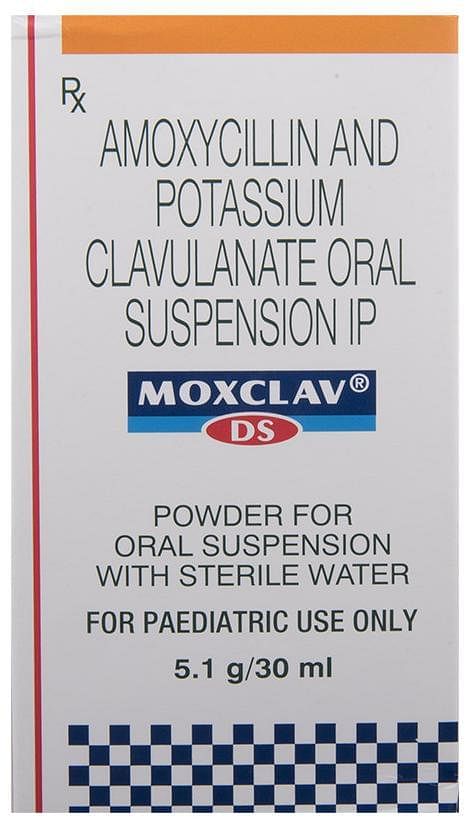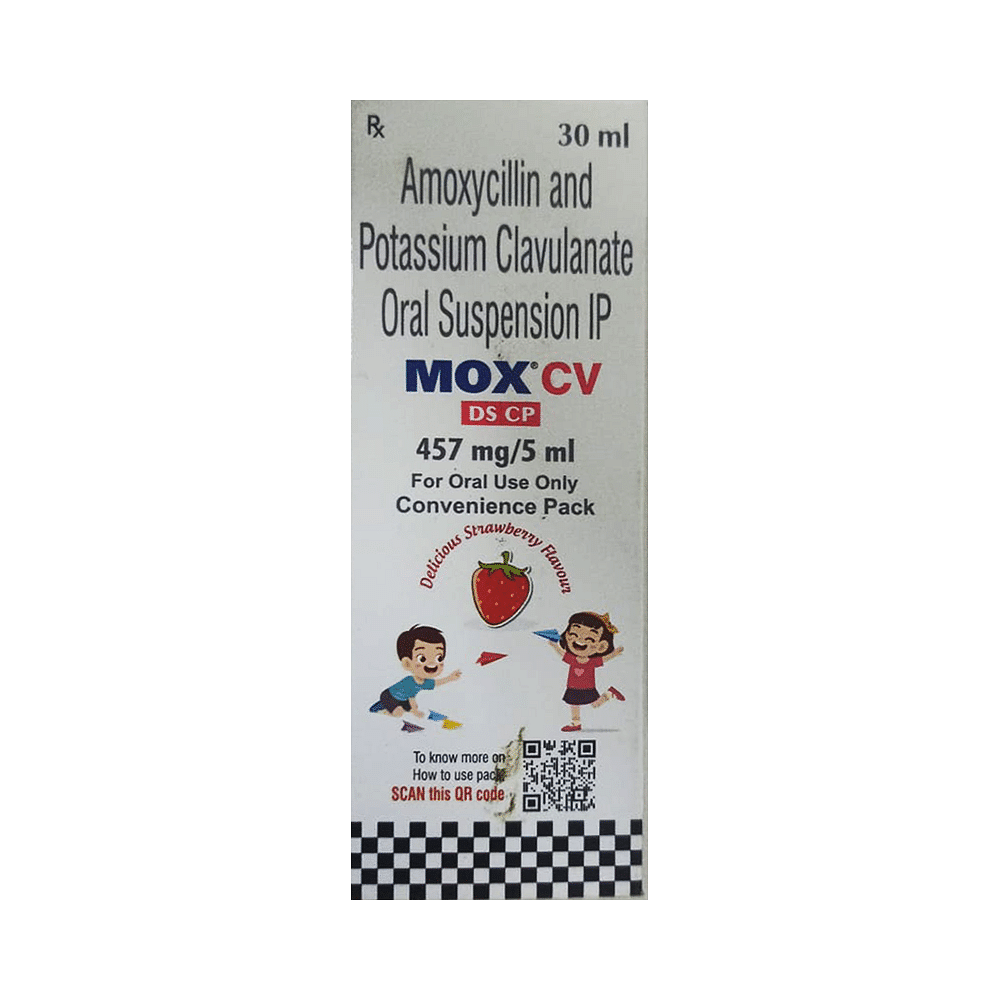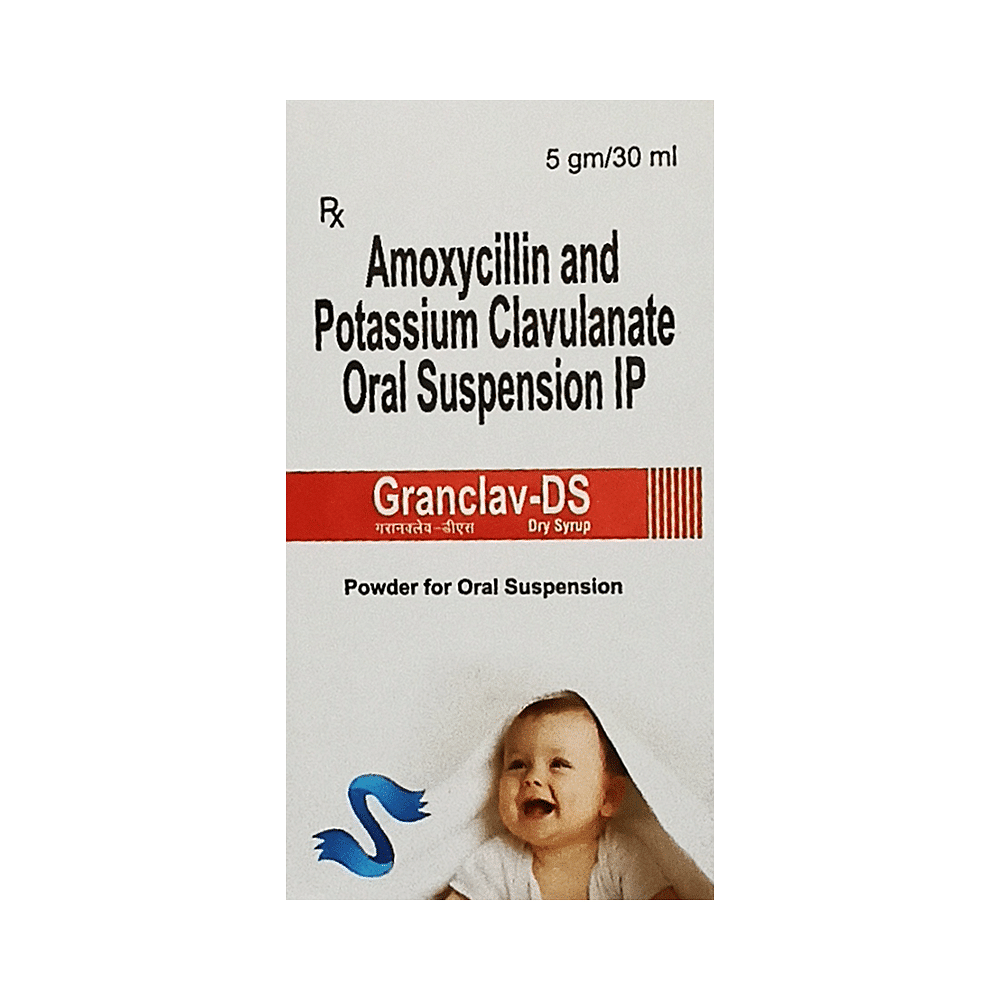
Clavicad DS Oral Suspension
Manufacturer
Cadell Healthcare Pvt Ltd
Salt Composition
Amoxycillin (400mg) + Clavulanic Acid (57mg)
Key Information
Short Description
Clavicad DS Oral Suspension is an antibiotic medicine that helps treat bacterial infections of the ear, nose, throat, chest, lungs, teeth, skin, and urinary tract.
Dosage Form
Oral Suspension
Introduction
Clavicad DS Oral Suspension is an antibiotic medicine that helps treat bacterial infections of the ear, nose, throat, chest, lungs, teeth, skin, and urinary tract. It is capable of killing bacteria that have become resistant to other therapies and thus also helps treat tuberculosis that is resistant to other treatments.
Directions for Use
Your child must complete the entire course of antibiotics. Stopping too soon may cause the bacteria to multiply again or cause another infection.
How it works
Clavicad DS Oral Suspension is an antibiotic. It has two active agents amoxycillin and clavulanic acid. Amoxycillin works by preventing the formation of the bacterial protective covering (cell wall) essential for the survival of the bacteria. Whereas clavulanic acid serves a special purpose of inhibiting an enzyme (beta-lactamase) that is produced by resistant bacteria. This makes the combination of amoxycillin and clavulanic acid an effective line of treatment for many types of infections.
Quick Tips
Your child must complete the entire course of antibiotics. Stopping too soon may cause the bacteria to multiply again or cause another infection. Encourage your child to drink plenty of water in case diarrhea develops as a side effect. Never give Clavicad DS Oral Suspension until and unless prescribed by the doctor. Do not give Clavicad DS Oral Suspension to treat common cold and flu-like symptoms caused by viruses. Check ‘expiry’ before giving Clavicad DS Oral Suspension to your child. Immediately discard all the expired medicines.
Related Medicines

Moxclav DS 457mg Oral Suspension

Mox CV DS CP Oral Suspension Delicious Strawberry

Bclav-DS Dry Syrup Orange

Granclav-DS Dry Syrup

Ziclave Forte Oral Suspension

Moxyben Oral Suspension

Amoxylla-DS Dry Syrup

Amxclavin Safe DS Oral Suspension

Moxycare CV Duo Dry Syrup

Stilmox-CV Dds Dry Syrup
Frequently asked questions
Can other medicines be given at the same time as Clavicad DS Oral Suspension?
It is essential to inform your doctor about any other medicines your child is taking before starting Clavicad DS Oral Suspension. Additionally, consult with your child's doctor before giving any medicine to your child, as Clavicad DS Oral Suspension may interact with other substances.
Can I get my child vaccinated while on treatment with Clavicad DS Oral Suspension?
Antibiotics, including Clavicad DS Oral Suspension, usually do not interfere with vaccine ingredients or cause adverse reactions in children who have recently been vaccinated. However, it is recommended to wait until your child has recovered from the illness before getting them vaccinated.
Which lab tests may my child undergo while taking Clavicad DS Oral Suspension on a long-term basis?
During prolonged therapy, your child's doctor may monitor kidney and liver function tests periodically to ensure their condition remains stable.
Can I give a higher than the recommended dose of Clavicad DS Oral Suspension to my child?
No, giving a higher dose of Clavicad DS Oral Suspension than recommended can increase the risk of side effects. If your child's symptoms worsen, consult your doctor for re-evaluation.
Can I stop giving Clavicad DS Oral Suspension to my child when the symptoms are relieved?
No, it is crucial to complete the full course of treatment with Clavicad DS Oral Suspension, even if your child's symptoms improve. Stopping the medication prematurely may lead to incomplete treatment and potential complications.
Can the use of Clavicad DS Oral Suspension cause diarrhea?
Yes, Clavicad DS Oral Suspension may cause diarrhea due to its antibiotic properties, which can disrupt the balance of helpful bacteria in your child's stomach. If your child experiences diarrhea, ensure they drink plenty of water or other fluids. Consult your doctor if diarrhea persists and you notice signs of dehydration, such as infrequent urination with dark-colored and strong-smelling urine.
Do all viral common colds result in secondary bacterial infection?
Most of the time, bacterial infections do not follow viral infections. It is essential to consult with your child's doctor before using antibiotics, as they can increase the risk of side effects and may not be necessary.
The mucus coming out of my child's nose is yellow-green. Is it a sign of a bacterial infection?
Yellow or green mucus in the nose does not necessarily indicate the need for antibiotics. During a common cold, it is common for mucus to thicken and change color. Symptoms often last for 7-10 days.
Is there any sign which shows that my child needs immediate medical attention?
Seek immediate medical attention if your child experiences severe allergic reactions (breathing difficulties, skin rashes), gastrointestinal infections (diarrhea), or liver damage (weakness, paleness, vomiting). Although rare, these side effects are serious and require expert attention.


